Lung Cancer : Type, Symtomps, Diagnosis, Treatment
 In the early stages, lung cancer does not cause any symptoms. The symptoms will only arise when cancer development has reached a certain stage. The following are the main symptoms that will be experienced by sufferers of lung cancer. Meet the doctor immediately or go to the clinic to make sure the diagnosis of symptoms experienced.
In the early stages, lung cancer does not cause any symptoms. The symptoms will only arise when cancer development has reached a certain stage. The following are the main symptoms that will be experienced by sufferers of lung cancer. Meet the doctor immediately or go to the clinic to make sure the diagnosis of symptoms experienced.- A continuous cough and getting worse, until finally experienced coughing up blood
- Experienced shortness of breath and chest pain.
- Experiencing fatigue without reason.
- Swelling of the face or neck.
- Headache.
- Pain in the bones could be on the shoulder, arm or hand.
- Body weight decreased.
- Loss of appetite.
- The voice becomes hoarse.
- Difficulty swallowing or pain when swallowing something.
- Changes in the shape of fingers, i.e. the fingertips becomes convex.
Types of lung cancer
There are two types of primary lung cancer based on the kind of cell, namely lung cancer small cell (small-cell lung cancer/SCLC) lung cancer and non-small cell (non-small-cell lung cancer NSCLC/). Lung cancer-non-small cell a chance four times more frequent in comparison with the lung cancer small cell.
Lung cancer small cell (SCLC) usually only afflicts the heavy smoker and its spread faster compared to the cancer lung non-small cell (NSCLC).
People who are at risk of developing cancer of the lung
Smoke can be said to be the primary cause of lung cancer. Individuals who are most at risk of lung cancer are smokers. About 80-90 percent of lung cancer associated with the habit of smoking. However, it does not mean any smoker will be affected by lung cancer. Also, people who do not smoke are also likely to have stricken with lung cancer, although the lower amount.
Besides cigarettes, some of the causes of lung cancer other than inhaling arsenic, radiation, and air pollution. Lung cancer is also more common in people who are elderly.
Diagnosis of Lung Cancer
For those of you who experience symptoms of lung cancer such as an ongoing cough, coughing up blood, shortness of breath, and chest pain should immediately see a doctor.
Early detection of cancer can improve the success of treatment. Here are some tests that can be performed to confirm the diagnosis of cancer.
X-ray. The first diagnosis of lung cancer usually uses X-ray. Imaging X-ray of the lungs may show existing tumors. If the X-ray is suspected lung cancer, further tests need to be done to be sure. CT scans can show an abnormally small that can not be seen by X-ray. By utilizing a CT scan, clearer imaging and detail can be obtained. PET-CT scans can show the location of the cancer cells is active. Imaging is usually performed if the results of the CT scan revealed that there were cancer cells at an early stage.
Sputum. A phlegm cough when we spend can be checked in the laboratory with microscopes. Sometimes this examination can be used to see if there are cancer cells in the lungs.
Biopsy or sampling of lung tissue. This procedure is done after a test showed that there are imaging and cancer cells in the breast. The doctor will take a sample of cells from the inside of the lungs.
Stage Lung Cancer
- Stage 1. Cancer is still in the lung and has not spread to the lymph nodes in the vicinity. Tumor size at this stage is still under 5 cm.
- Stages 2. Tumor size of anything that has spread to other parts like the lymph nodes, chest, diaphragm, or the lining that encloses the lungs. Moreover, cancer is also classified as stage 2 if it was larger than 5 cm.
- Stages 3. At this stage, there are cancer cells that have spread to lymph nodes that are far away from the lungs or the tumor in the lung is already enormous and invade another organ near the lungs.
- Stages 4. Cancer had already spread to the lungs, or other organs side far from the lungs such as the brain and liver, or fluid containing cancer cells may have already appeared around the heart or lungs.
Treatment of lung cancer
Treatment for lung cancer depends on the type of cancer suffered. The rate of spread of cancer and health condition the sufferer was also influential on the methods of treatment and the handling is done.
Surgical removal of cancer can be done if the cancer cells have not spread widely to other parts of the body. If health conditions do not allow for a surgery appointment, other responses could be applied. The process of the destruction of cancer cells by way of radiotherapy can run.
Lung cancer does not cause any symptoms before the cancer cells spread to vast areas of the lungs or other parts of the body. Healing depends on the spread of disease and when a diagnosis of cancer. The more early diagnosis is made, the chances of successful treatment to also be higher.
Tags :
disease
Subscribe by Email
Follow Updates Articles from This Blog via Email

No Comments